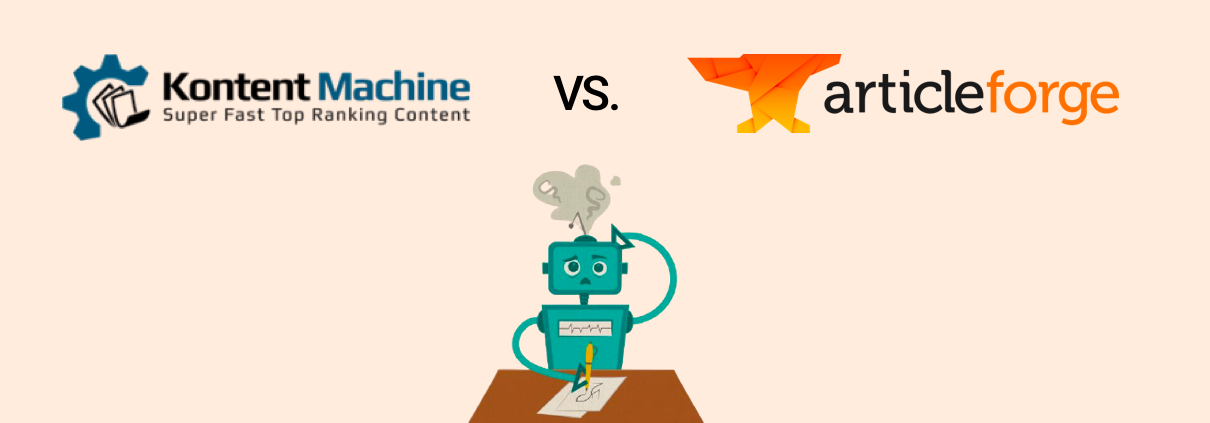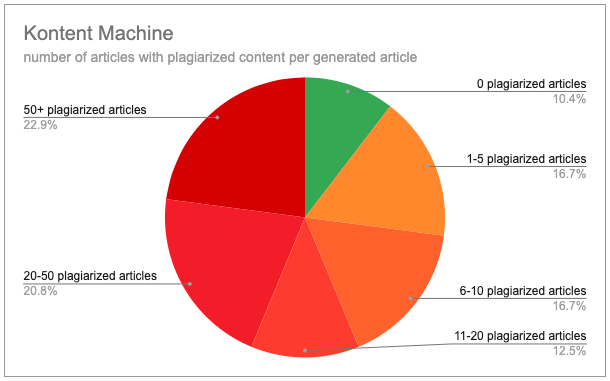Kontent Machine Vs. Article Forge Comparison

| Tool | Content Quality (out of 5) | Uniqueness | How is Content Created? | Topic Coverage | Speed (words per second) | User Experience (out of 5) | Price |
|---|---|---|---|---|---|---|---|
| 1. Article Forge | 3.09 | 100% | AI/Deep Learning Models | 100% | 5.84 | 5 | $57/mo - unlimited articles |
| 2. Kontent Machine | 2.04 | 10.40% | Scraping & Spinning | 87% | 6.58 | 1 | $37/mo - unlimited articles |
Introduction
We know that there are a lot of tools on the market that claim to be able to automatically generate content. We have tested the most prominent tools in the industry to determine which is the best (you can find that post here). But we wanted to go a bit more in-depth about the differences between Article Forge and Kontent Machine.
To fully understand the differences between the tools, we compared them in the above 7 categories. In short, Article Forge is a much higher quality product than Kontent Machine, but we will explain how we came to that conclusion below.
How we set up the tests
To fully compare the tools, we created a list of 54 keywords that covered both short-tail and long-tail topics. We then generated articles for each of those keywords using each of the tools to create the dataset for our tests.
We then ran tests and analyses to determine: content quality, uniqueness, and presence of duplicate content, how the tools create content, topic coverage, speed, user experience, and price.
Content Quality
Just creating tons of content is not good enough to help you rank anymore. Google has gotten much better at detecting poor quality content – including detecting syntax patterns that indicate that the content was was scraped instead of written by a human. So it is more important than ever to make sure all the content you are using is high-quality human readable. So, we ran two studies to determine the quality of the articles we generated with Kontent Machine and Article Forge.
First, we asked participants (using Mechanical Turk) to rate articles from 1 to 5 based on: overall readability, syntax, relevance to the given keyword, flow of the article, accuracy, and completeness of the article. Article Forge articles averaged 3.09 out of 5 while Kontent Machine averaged 2.04 out of 5. From our analyses, anything below a score of 2.0 was unusable, scores between 2 and 3 would require major revisions before they could be used.
In the second test, participants (also using Mechanical Turk) compared side by side articles and were told to choose which article was higher quality based on the same criteria as the first test. In the second test, participants preferred Article Forge 794% over Kontent Machine.
Uniqueness
Uniqueness has played a huge part in Google’s ranking algorithms since 2011 so using completely unique, duplicate free content is just as important for rankings as the quality of the content itself.
We used CopyScape to determine if the articles in our dataset had any duplicate content. 100% of Article Forge’s articles came back with zero duplicate content while only 10.4% of Kontent Machine’s articles came back without any plagiarized content.
The chart below breaks down just how much duplicate content exists in each Kontent Machine Article.

How the articles are made
Given the results of the quality and uniqueness tests, we wanted to understand what was creating such a big difference between Article Forge and Kontent Machine. The answer is simple: Kontent Machine is scraping and spinning content and Article Forge is using deep learning artificial intelligence (AI) models to write content automatically.
Kontent Machine is very open about the fact that their tool just scrapes and spins the content. In fact, you have to provide your own proxies for Kontent Machine to use when scraping sites for you. The next step in the process is then to select which spinner you would like to use to create your article from the scraped content.
Article Forge, on the other hand, openly refers to using AI models to write each article from scratch. This is evident because their articles read naturally, their content is completely unique, and if you look up the company, it is made up almost entirely of AI engineers.
This is likely responsible for the stark difference between the quality and uniqueness of Article Forge’s content compared to Kontent Machine.
Topic coverage (can it write about any niche)
If an article generator cannot write about your chosen topic, then the rest of the tests in this post do not matter. Luckily, running topic coverage tests were rather straightforward. The first test calculated the percentage of keywords the article creators could write about.
Article Forge generated articles for all of the keywords it was given and Kontent Machine covered 88.8% of topics.
The second test calculated the percentage of articles written that actually contained the keyword given.
100% of Article Forge articles and 97.9% of Kontent Machine articles contained the given keyword.
The combined results of the above tests mean that you can expect Article Forge to write about any keyword while Kontent Machine will write about a given keyword 87% of the time.
Speed
Kontent Machine is a desktop tool that requires a bit of time to install and setup while Article Forge is a web-based tool that has zero setup time. However, we did not include that time when calculating speed. We only timed from entering the keyword to getting the resulting article.
When testing the longest article length, Article Forge took an average of 2 minutes 2 seconds to write each article.
Kontent Machine does not let you choose the length of your articles but took an average of 1 minute 11 seconds to return each article.
This is quite a time difference, so to ensure consistency, we converted each article’s speed into words per second. Article Forge wrote an average of 5.84 words per second while Kontent Machine generated an average of 6.58 words per second.
Kontent Machine delivers articles almost twice as fast as Article Forge but, the words per second average show that Kontent Machine writes shorter articles on average. In addition, Kontent Machine does take a bit of time and effort to set up before you can create articles.
User experience/ease of use of the tool
Overall, Article Forge offers a much more intuitive user experience than Kontent Machine.
Article Forge is a web-based tool so there is no setup time required before you can create your first article. Kontent Machine, on the other hand, is a desktop tool that only supports Windows operating systems. And, once you download Kontent Machine, there is a lengthy installation process.
While Article Forge has multiple settings that allow you to customize your articles (you can select article length, automatically add links, images, and videos), it also offers a single step article creation process (just enter your keyword and click “Create New Article”).
Kontent Machine requires you to add your own proxies before you can begin to generate content. However, once you set up your proxies and your first campaign, Kontent Machine’s process is rather simple to iterate on (this plays into the fact that the single article creation speed is much faster than Article Forge).
Both tools have the ability to post content directly to a blog automatically, however with Kontent Machine, this is not advisable because the content might not be publishable even with significant manual edits. In addition, both tools offer API access so that you can add content creation to any of your SEO pipelines.
Price
Both tools allow unlimited content generation subscription plans.
Kontent Machine’s prices are a bit difficult to find on their home page, but they seem to always be running a 40% off discount. Marketing material aside, it appears that you can buy Kontent Machine for $37/month or one lifetime payment of $217.
Article Forge offers two unlimited plan options: $57/month or $324/year. No matter how you cut it, Kontent Machine is significantly cheaper than Article Forge.
Overall grade and takeaways
| Tool | Content Quality (out of 5) | Uniqueness | How is Content Created? | Topic Coverage | Speed (words per second) | User Experience (out of 5) | Price |
|---|---|---|---|---|---|---|---|
| 1. Article Forge | 3.09 | 100% | AI/Deep Learning Models | 100% | 5.84 | 5 | $57/mo - unlimited articles |
| 2. Kontent Machine | 2.04 | 10.40% | Scraping & Spinning | 87% | 6.58 | 1 | $37/mo - unlimited articles |
Article Forge is the hands down winner in quality, uniqueness, coverage, user experience, and how the tools are creating content.
While one year of Article Forge is more expensive than a lifetime license for Kontent Machine, the difference between the tools in the above categories more than makes up for the difference is cost.
In addition, while creating a single article with Kontent Machine is faster than Article Forge, Kontent Machine requires a lengthy installation process and does not allow you to create articles in bulk as Article Forge does.
Finally, the differences in quality (3.09 vs 2.04) and uniqueness (100% vs 10.4%) are arguably the most important takeaways. Kontent Machine’s performance in the above tests means that any of their content would throw up huge red flags for Google and would at best do nothing for your rankings and at worst, might even harm them.
Overall, paying a premium for Article Forge will save you more time, money, and headaches in the long run than using Kontent Machine.

